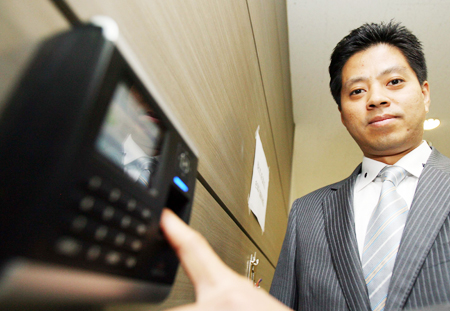
Suprema comes back in big way

Korean biometrics company Suprema, which leads in fingerprint recognition technology, is angling for further growth. The firm can now see an end to worries over a patent lawsuit in the United States that has plagued it for the past few years.
“The legal action is practically done. We do not think that the initial rules of the U.S. International Trade Commission (ITC) will be overturned, which by and large were favorable to us,’’ Suprema President Lee Jae-won said in a recent interview with The Korea Times.
“The gist of the ITC’s decision was that infringements on patents took place with our old models that are not on sale but not for our new versions, our go-to products currently available.’’
Cross Match Technologies brought Suprema and the Korean entity’s partner Mentalix to the U.S. court in 2010 claiming that the latter’s RealScan products violated its patents.
In the judgment issued midway through 2011, the ITC did not definitively rule entirely on either side. Instead, it said some patents were violated while others were not.
This prompted both sides to claim victory while petitioning the review of the case. Lee said that Suprema has told the truth.
“We unknowingly infringed on the Cross Match patents for our old-fashioned models, which depended on optical structures. We do not sell them any longer,’’ the 43-year-old said.
“To cut the cost of our products, we later opted for our software algorithm, which has nothing to do with Cross Match and the ITC accepted it. As long as the rulings do not change in substance, we have no legal risks.’’
Regarding the financial burden, Lee also claimed that there are no concerns.
“For the ITC’s decision, we have spent almost 6.8 billion won. But by the next ruling, the necessary amount will be much less, around just 1 billion won for this year,’’ he said.
Earnings surprise
The suit cost Suprema dearly, as it was one of the hottest stock investments on the technology-filled Kosdaq market in late 2000s before the Bundang-based firm, south of Seoul, was embroiled in the lawsuit.
Its market capitalization surpassed 320 billion won in June 2009 but plunged to as low as 102.5 billion won last August before the ITC’s verdict was finalized.
Yet, the ITC’s rulings were good enough to reinvigorate investor sentiment in Suprema, which was founded in 2000 at the peak of the global information technology bubble.
The firm saw a double boost in share price thanks to its strong fundamentals as demonstrated by its first-quarter performances this year. As a result, its market capitalization has doubled in less than a year to upside of 200 billion won.
When analysts gave optimistic estimates of 13 billion won in sales and 3 billion won in operating profit for the January-March period, many were reluctant to believe them.
Yet, the first-quarter results even beat the seemingly high forecast at 14.4 billion won in turnover and 4.5 billion won in operating income and its chief executive claims that the best is still ahead.
“We expect to chalk up annual revenues of between 55 billion and 60 billion won this year with operating profit amounting to about 30 percent of the total,’’ Lee said.
“Hopefully, we will be able to reach the 20 billion won milestone in operating income. Though to achieve that, we will need turnover of higher than 60 billion won.’’
Lee has one outstanding reason to paint such a rosy picture for the firm’s future ― he believes that Suprema is second to none as far as fingerprint recognition technology is concerned.
He expects that the U.S. market will offer new opportunities while future cash cows including face recognition systems are on the horizon.
“Up until now, the U.S. market has accounted for less than 5 percent of our revenue. But sales there are expected to jump this year as the public will knock on our door after the lawsuit is completed,’’ Lee said.
“In the commercial U.S. market, we have good news that BioScript, which was our benchmark in the past, disappeared and its sales network is now in our hands thanks to recent contract with ADI.’’
Suprema struck a deal with ADI, a distribution giant in security products such as closed circuit television, radio-frequency terminals and biometric goods. It has a global network and is particularly strong in the United States with a majority market share.
The collaboration with ADI is expected to boost Suprema’s sales among U.S. dealers and, eventually, with end consumers further down the road.
Futuristic technology
“Compared to 2009 when our market capitalization peaked, our fundamentals and stability of cash flows have improved substantially. Plus, we have a set of rising markets like the United States and Africa,’’ he said.
“And we have next-generation technology in facial recognition. We already released commercial products for it early this year.’’
Suprema took the wraps off FaceStation, a face recognition terminal, in April, which it argues can identify twins in the dark.
Based on features including adaptive infrared rays employed for the first time in the world and advanced security applications, Suprema boasts that any attempts to defeat FaceStation are impossible.
Plus, it can identify people in a thousandth of a second, which is far faster than the system for fingerprints, which typically takes a fourth of a second.
“It is relatively easy to recognize people by their faces fairly correctly. But the point is that it should be absolutely correct with virtually no errors and that is the difficult part,’’ Lee said.
“That’s the advantage of our products and we keep trying to upgrade them. In the future, the face-cognitive programs will be used across the board. For one, it can be a killer application in cell phones for owner identification.’’ <Korea Times>


